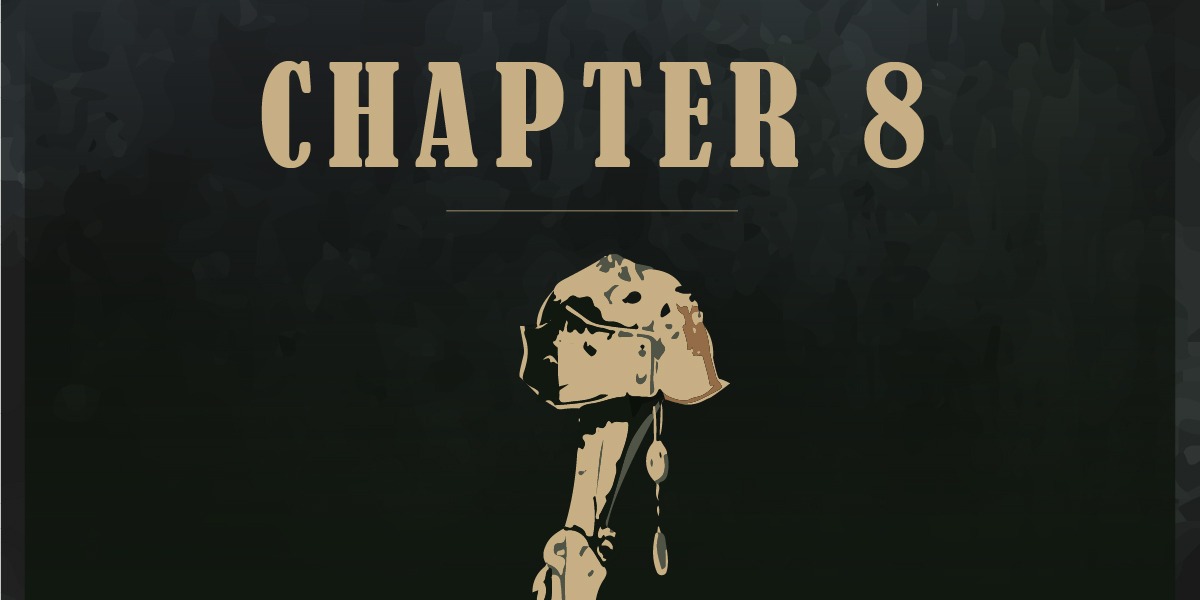
The town of Albyn, Llael.
9th of Octesh, 611 AR.
Forgeseer Yegor Nikolayev gazed at the picture in his spyglass: a hill, covered in Khadoran infantry and artillery, heavily fortified, facing the direction of the invasion Southeast, their backs to him. The freshly-turned earth of a trench and bulwark was still dark upon the patchy verdant grass. A puff of smoke appeared, followed by a distant boooff. A mortar discharge. The juxtaposition of the nearness of the image in the spyglass and the delayed sound was momentarily disorienting. He felt a shift in the energy of the officer beside him.
“Onya nas d’priveliki, Kuznitsa,” his compatriot said.
They’ve engaged us, Forgeseer.
“Mm. Da,” Yegor replied calmly. “Noya razved’chkit. Ne shila glavnaya.”
A scouting party only. Not the main force.
“Nashi prigoto levinya ne de kubra’shno,” his companion replied.
We finished our preparations not a moment too soon.
“The bear trap is set,” Yegor said. “You’ve planned it well, Vasily. We will break the ankle.”
Winter Guard Kovnik Vasily Bazarov stood looking through his own spyglass at their front line, his furry ushanka-hat rippling in the breeze. It was unseasonably warm for such dress, but the Seventy-First WGK had been transferred to Llael out of a northern garrison in the motherland, and Vasily took too much pride in his uniform to discard any part of it for convenience. Yegor respected that. They stood together on the widow’s walk of a five-story building in the town center, well-crafted shingled rooftops sloped gracefully around them. He grunted.
“Yegor, this is no bear we are trapping. This is a dragon,” Vasily said. Yegor made a disgusted noise and collapsed his spyglass.
“You give the First Army far too much credit, Kovnik Bazarov,” Yegor said dismissively. “A dragon in size alone, perhaps, but it is dim-witted, slow, cumbersome. We are small but fast, and and he does not know where we lay in wait,” he said, a faint smile under his bushy black beard.
Vasily sighed, pulling off his hat to wipe sweat from his brow. “But when the trap strikes, the dragon will whip its tail in rage, and I am not confident we can avoid being beaten to death.”
“We will not avoid it,” Yegor said grimly. “It will hit us with all of its might. You know what the Motherland is asking of us,” he said with conviction. “We will succeed. That is all but guaranteed. But survival… That is not.”
“I have accepted my death, Yegor,” Vasily said calmly. “I feel sadness only that our soldiers in this town must follow us into urcaen as a result,” he said softly. “They are good men and women. They would slay many more southerners, if given the chance.”
The two men turned to the open hatch in the roof and descended the narrow wooden stairwell. Vasily first, with Yegor’s heavy lumbering frame and wizard robes swooshing behind.
“Do not pity them,” Yegor’s baritone voice rumbled. “Death comes to all. We are giving their deaths a story of legend: they will die bringing down this dragon.” They reached the first floor and walked into one of the streets that circled the town square.
Bird chirped happily in the trees that lined the avenue. It was such a lovely town, truly. Albyn had been a model of acquiescence in Khador’s capture of Llael; the town had surrendered with no fight and left completely. For years now it had been a peaceful place, meeting the motherland’s expectations for imperial taxes and largely being left alone as recompense. With some additional Khadoran citizenry and construction, it could have become a truly first-class city.
Now, because of the Cygnaran crown’s insolent need to snatch from the Empress what rightfully belonged to her, this idyllic dream was not to come true. Yegor wished he had a CRS prisoner to torture in order to relieve his rage at the profound injustice of it all. He calmed himself by remembering the opportunity to slay was coming: he would bathe these cobblestones in the blood of the enemy. He needed only be patient.
Another mortar blast rumbled over the hills.
“I do not pity them,” Vasily said defensively as they walked. “I pity their wives and husbands and children.” Yegor found this sentimental aspect of Vasily to be a real weakness, and somewhat irritating, but he didn’t feel like arguing about widows and orphans. He grunted noncommittally. There was a more pressing concern, a greater problem that Kovnik Vasily Bazarov’s compassion was creating…
“Kovnik,” Yegor began. “I must implore you once more to reconsider my addition to your battle plan,” he said. “Our mission is to halt and then cripple the First Army’s advance, but I fear you have placed a pin in the hinge of our trap that will stop it from closing fully.”
Vasily stopped and spun to face the much larger Yegor.
“I know what you would say, Forgeseer,” Vasily spat. “And I have told you once before that you are not to make that recommendation again. Was it not clear that I was providing you with an order?” his face was dark with anger. Yegor regarded him calmly.
“I do not recall you ordering me to silence on this matter,” Yegor said, “but that is beside the point. You are letting your mercy for the citizenry in Albyn blind you to the larger reality of our situation. They are going to die,” Yegor said, raising his eyebrows and holding out his arms. “Why do wish to condemn them to a meaningless ending?”
“I will not be the one to kill them,” Vasily said.
“You know that is not what I am suggesting,” Yegor said gently. Vasily exhaled sharply in frustration.
“No, no that would be a mercy compared to what you want. What you are asking…” Vasily closed his eyes and rubbed his brow. “Why did High Kommand not permit me to evacuate them as I asked?” he complained in despair.
“Because they knew having civilians among us would force the enemy to pull their blows and slow the assault,” Yegor said reasonably. “Every citizen of the empire must serve in their own way, and this is how High Kommand has seen fit that they serve. But these people can do so much more for us, beyond merely shielding us from artillery strikes! We are losing time,” Yegor said urgently. “If you would only allow me–”
“Enough,” Vasily said sharply. He took a step towards Yegor, gazing up at him, unintimidated. “I have given you an order: do not bring this up again. I swear to you, Yegor, if you had demonstrated this insolence in front of my men, I would have had you shot for insubordination,” he said, voice quivering in fury. Yegor could see Vasily meant his words.
“Last I checked,” Yegor said, his voice steely, “the Greylords Covenant does not answer to you, Vasily. And I do not think they would appreciate discovering you making threats of execution against a member of their order.”
“The Covenant may not be under my authority, but you answer to me,” Vasily said. “And seeing as you are their only representative here, the report of your fate will say whatever I want it to say,” he hissed. “I will not tell you again. This discussion is over. Bring it up once more, and I will kill you myself.” Vasily spun on his heel and stormed off down the street, fists shaking in anger. Yegor watched him go.
Vasily was a good man and a good commander. He had created a tactically advantageous situation in the face of enormously bad odds, and Yegor respected him for it. A tremendous number of trenchers were about to die in battle because of that man’s planning. But his moral inflexibility was leaving a glaring weakness in their chance for success. Yegor had tried repeatedly to be reasonable, to bend Vasily to see his error. Yegor could now see that this was not going to happen, and the window of opportunity for him to fix Vasily’s mistake was rapidly closing. Vasily’s threats only added to Yegor’s unease. He did not feel even remotely intimidated by the man; Yegor could freeze Vasily’s brain in his skull before he could even reach for a sidearm, or summon an icicle and puncture his heart with it.
But that was not the point. Being a successful commanding officer was more than elaborate planning. It was also about flexibility, adapting to a changing battlefield, and driving all under your command to serve the motherland to maximum effect. Yegor had no doubts about Vasily’s loyalty, but loyalty was not always enough. The truest form of service was bending low enough to do the thing nobody else was willing to do. If the Empress’ life were threatened, and only shooting a child could save her life, Yegor would not hesitate for even a moment; the child would die.
He was not certain that Vasily had the same…intensity.
If Yegor could not compel Vasily to do this deed, then Yegor would have to do it himself. Which meant removing Vasily from command without sabotaging the respect or loyalty of his troops. His own impending death eradicated all fears about a court-martial as consequence for his actions. But he needed the Winter Guard kompany occupying the town to follow his orders, and openly committing a coup wouldn’t serve that end; the soldiers would attempt to apprehend or execute him and instate their second-in-command. Yegor had three warjacks at his disposal and could probably threaten them into submission, but he wasn’t interested in taking his own troops’ lives in order to wrest leadership. He would need every one of them to fight the enemy.
No, he was going to have to wait a while longer. An opportunity would present itself, probably during the heat of the coming battle. The timing would be terrible and he wasn’t certain it would be enough for him to put his plan into motion even after Vasily was out of the way, but it would have to do. Yegor would take no pleasure in Vasily’s death.
He would also not shy away from killing him.
For Yegor, there was no task too terrible if it elevated the Motherland, no job too demeaning. He was going to break the spine of whatever Cygnaran regiment was headed toward them and Vasily would not interfere.
Not Vasily, and not anyone else.
< PREVIOUS
NEXT >

